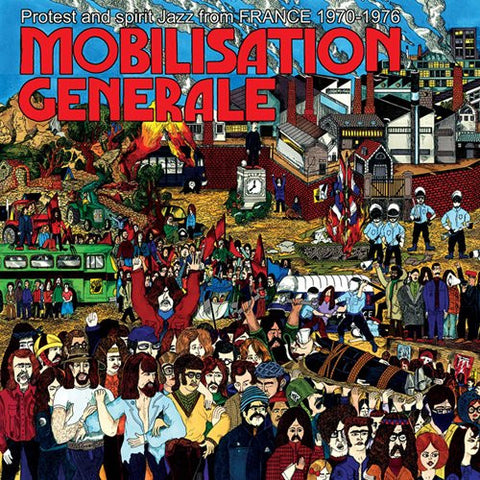V/A - Mobilisation Generale: Protest and Spirit Jazz from France 1970-1976
"1968. France, Incorporated. The entire building was being consumed by flames and was slowly collapsing. Nothing would survive. Out of the rubble of the old world jumped the children of Marx and Coca-Cola, ripping the white and blue stripes off the French flag. Yet, the socialist revolution was more mythic than real and music did nothing to mitigate peoples behavior. It was time for innovation. While singles from The Stones, The Who, The Kinks and MC5 provided an incendiary soundtrack for the revolution, it was Black Americans who truly blew the world from its foundations in the 60s. Ornette Coleman, Cecil Taylor, Eric Dolphy, Albert Ayler, and Archie Shepp left behind the jazz of their fathers generation, liberating the notes, trashing the structures, diving headfirst into furious improvisations, inventing a new land without boundaries -- neither spiritual nor political. Free jazz endowed the saxophone with the power to destroy the established order. In 1969, the Art Ensemble Of Chicago arrived at the Th_ɬ©_ɬ¢tre du Vieux Colombier in Paris and a new fuse was lit. Their multi-instrumentalism made use of a varied multiplicity of little instruments" (including bicycle bells, wind chimes, steel drums, vibraphone and djembe: they left no stone unturned), which they employed according to their inspirations. The groups stage appearance shocked as well. They wore boubous (traditional African robes) and war paint to venerate the power of their free, hypnotic music, directly linked to their African roots. They were predestined to meet up with the Saravah record label (founded in 1965 by Pierre Barouh), already at the vanguard of as-yet unnamed world music. Brigitte Fontaines album Comme _É la radio, recorded in 1970 after a series of concerts at the Th_ɬ©_ɬ¢tre du Vieux Colombier, substantiated the union of this heiress to the poetic and politically-committed chanson fran_ɬßaise with the Art Ensemble Of Chicagos voodoo jazz and the Arab tradition perpetuated by her companion Areski Belkacem. A UFO had landed on the turntables of French teens, who were discovering underground culture via publications like Actuel, Lib_ɬ©ration, Charlie Hebdo, Rock & Folk and a vigorous free press. For 20 year-olds in the early 1970s, making music was a political act; they grabbed a microphone to advance a cause, not to become rock stars. While the price of oil skyrocketed and Pompidou went overboard building horrible concrete apartment buildings for public housing and "adapting the city for the automobile," some took refuge in the countryside. Alternative communities formed all across France, giving rise to groups (or rather, collectives) with open-minded structures, cheerfully mixing music, theatrical happenings and agitprop, along with a good dose of acid. Projects bordering on the ridiculous were often tolerated (progressive rock was one of the primary banalities the era produced), while those who followed the route paved by spiritual jazz often ended up elsewhere. The vehemence (if not grandiloquence) of their declarations was carried and transcended by the finesse and brilliance of their musicianship. Simultaneously spatial, pastoral and tribal, the tracks in this collection represent an ideal intersection between a sort of psychedelic legacy, the space jazz of Sun Ra and Afro Beat (then being created by Fela in Lagos): they are as much incantations (often driven by the spoken-word), war cries or poems as they are polemics. 1978. Giscard was at the helm. Punk and disco were busily decapitating the last remaining hippies. Peoples blood was still boiling, but it was already too late. The war was over, lost without anyone noticing. Nevertheless, people still tilted at windmills or talked tough in dead-end struggles; a dream is not so far from a nightmare. We knew that an enchanted era had ended, the hope for a brighter future was now behind us and that we would leave behind nothing for our children but a few records. Indeed, ghosts may still crackle from our speakers, as the 45 spins and Brigitte Fontaine asks Areski: "H_ɬ© mais je pense _É un truc, on ne va pas mourir dans une minute?" (trans. "Hey, I was just thinking, arent we going to die in a minute?"). Features artists such as Alfred Panou & Art Ensemble Of Chicago, Brigitte Fontaine & Areski Belkacem, Atarpop 73 & Le Collectif Le Temps Des Cerises, RK Nagati, Fr_ɬ©d_ɬ©ric Rufin & Rapha_ɬ´l Lecomte, Fran_ɬßois Tusques, Mahjun (Mouvement Anarcho H_ɬ©ro_ɬØque des Joyeux Utopistes N_ɬ©buleux), Full Moon Ensemble, Baroque Jazz Trio, Michel Roques, Ch_ɬ™ne Noir, and Beatrice Arnac. Gatefold sleeve." -Born Bad.
-
Sale
- Regular price $28.00


